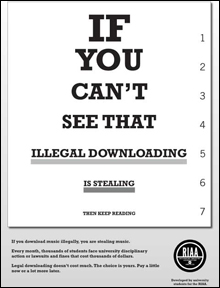
PROPAGANDA RIAA: tries to convince students, or sue them. |
University of Maine officials are opposing recording-industry efforts against alleged illegal downloading of music, saying federal student-privacy laws prevent them from putting industry lawyers in touch with 27 UMaine students the industry says are illegally pirating music.
UMaine is among the few universities to stand up to the industry — many others, such as Ohio University (the school believed to have the largest number of illegal student downloaders), caved in to industry pressure almost immediately, passing along letters from the Recording Industry Association of America to students the RIAA alleges are stealing music. UMaine has notified students that they can pick up the letters, if they wish, from an office on campus, but has refused to tell the RIAA who the students are, citing provisions in the Family Educational Rights and Privacy Act, a federal law limiting access to student records.
“FERPA prohibits us from giving out information about students that would link them to any identification numbers,” says John Diamond, spokesman for the University of Maine System. “It is up to the students to decide whether to take advantage of the settlement option put forth by the RIAA in the letters,” he adds.
The letters direct the students to a Web site, www.p2plawsuits.com, where they can settle their cases online, for an unspecified fee, claimed by RIAA to be “generally lower” than the roughly $3000 settlement demand made in court filings by the association.
The RIAA has won some (Elektra v. Perez) and lost some (Elektra v. Santangelo) of the court cases it has taken up against alleged copyright infringers, but the threat of lawsuits did not stop the nearly 10 million simultaneous users on the major peer-to-peer (P2P) networks in 2006, according to a recent study published in the Journal of Political Economy. The study also reported that about 60 million people have accessed P2P networks since their inception. With the Wall Street Journal’s recent report that CD sales are down 20 percent in the first three months of this year, the recording industry will undoubtedly keep trying to quash online music sharing.
The Electronic Frontier Foundation (EFF), a donor-supported nonprofit dedicated to defending the public’s digital rights, has a different idea about the future of copyright in the digital music industry. In the early twentieth century, a similar battle was being fought, although between the songwriters and radio stations that played songs without paying royalties. The American Society of Composers, Authors, and Publishers tried suing the radio stations, but the groups found a middle ground called Voluntary Collective Licensing. The radio stations paid fees to the record companies in exchange for the rights to play whatever they liked from those labels. The EFF is suggesting a similar measure for people who make music files available on P2P networks. They would pay a small fee (the EFF suggests $5 per month) to have full access to a label’s catalog and the option to download and make available any songs owned by that label. The $5 is significantly less than the settlement of a lawsuit and is pure profit for the recording label.